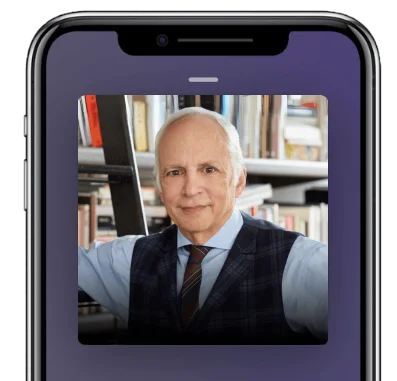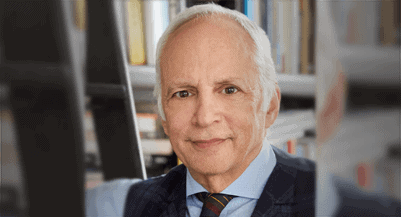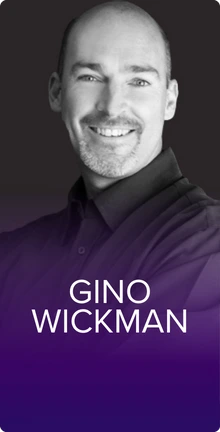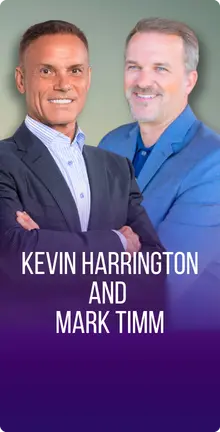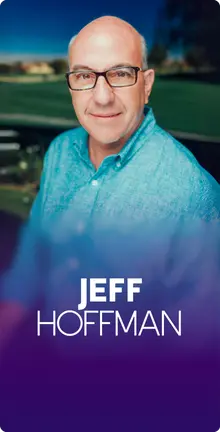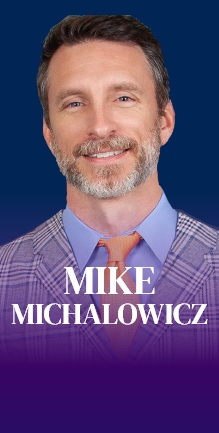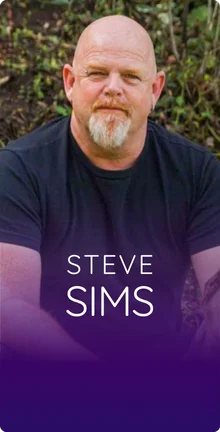In this Episode
- [00:32]Stephan introduces B. Jeffrey Madoff, founder of Madoff Productions and the author of Creative Careers.
- [05:48]Jeff shares the multiple businesses he owns and the challenges he surpassed along the way.
- [12:01]Jeff mentions the important lessons he learned while transitioning to the film business.
- [17:26]Jeff explains how there’s a lot more similarities than differences among the different kinds of businesses.
- [23:43]What are some lucrative business processes for a business that deals with arts and creativity?
- [30:16]Stephan shares an unexpected experience he had while interviewing an applicant for a CEO position.
- [36:29]Jeff shares an example where the Stanislavski Method was effectively applied by one of his students.
- [42:08]What is the difference between an artist and an entrepreneur?
- [48:32]Jeff shares two key factors to help foster creativity.
- [52:22]Follow B. Jeffrey Madoff on his social media accounts and visit his website, madoffproductions.com to learn more about his work.
Jeff, it’s great to have you on the show.
Thank you, Stephan. I’m thrilled to be here. Thanks for inviting me.
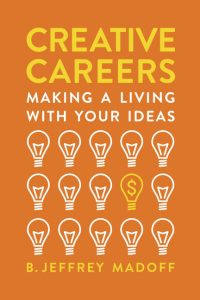
Let’s first of all, talk about what inspired you to write the book Creative Careers. Because you have such an amazing, storied background, you probably have plenty of things to keep you busy. Was there a book burning inside you that had to come out, or was there an opportunity that just you couldn’t say no to a publisher insisting on giving you a six-figure advance or something? How did this book end up coming out of you?
I wish that was the case, but it’s not. You know what happened, Stephen? I was kept getting asked by people, “Are you doing a book about this class? These ideas on how to get a wider hearing than just the classroom. This is useful to people who are looking to change careers, entrepreneurs, all kinds of people that this should reach.” I didn’t frankly know how to go about getting a book published, and it was serendipity that the right people at the right time converged. There was a publisher, Hachette, who published my book, after being turned down by other publishers. The business book publishers saying, “Well, why would business people want to know anything about creativity?” And then on the self-help, which is where creativity books are, it was, “Well, why would creative people care about the business?” That’s the whole point of the book, why they should. But when my agent pitched it to Hachette, they immediately saw that business and creativity go hand in glove. So we had a great presentation, and they bought the book. I wish for a fraction of what you said. But I wanted to get the ideas out there. I kept hearing that, over the years, because I’ve been teaching this class for 14 years, and I kept hearing, “You should write a book.” Fortunately, everything came together, and I did and was able to sell it.
That’s great. Congratulations. I’m curious, what is the name of the course that you teach at Parsons?
Ah, coincidentally, and deliberately. It’s called Creative Careers: Making a Living With your Ideas.
Business and creativity go hand in glove.
Got it. Great. And that’s exactly the subtitle on your book as well; Making a Living With your Ideas. And this is something that may be kind of counterintuitive to some folks, like if you’re, let’s say, a musician or an artist, is that something you could make a living at? Most people are kind of starving artists. That’s the expression, after all. Is there some sort of secret to making it pay off or is it mostly luck?
There’s a lot of factors. But the secret is the starving artist myth, as I call it, there are lots of artists that aren’t starving. You talk about musicians, and if you look through, I’d love to change bank accounts with Bruce Springsteen. I’d love to change bank accounts with Paul McCartney. I’d love to change bank accounts with Beyonce, and on and on and on. And these are all creative people who make their living through their creativity. I think the starving artist, be they in a garret or that cubbyhole of an apartment in New York City down in the village. These are the myths that make for books and movies. And if you’re going to be an artist, if you’re going to be creative, you want to be an exception to the rule anyhow. You want to be able to pursue those things that you love, and what’s better than making a living doing what you love? It’s not easy, but it’s not easy to do what you do; it’s not easy to do anything when you start your own business and try to build it up and sustain it.
To say that there’s no money in the arts is quite crass. There’s a lot of artists who aren't starving like Bruce Springsteen, Beyonce, and Paul McCartney. Share on XYeah. What roadblocks and hurdles did you have to kind of maneuver around to be successful with your business? And do you have multiple businesses or just a Madoff Productions is the only business you have?
Well, I also have the Hard Kill. And the Hard Kill is the LLC that I’m producing the play Personality, the Lloyd Price Musical. Got it. And then separately, I’m employed as an adjunct professor at Parsons School for Design. So there are different entities, but the umbrella, I guess, would be Madoff Productions. That was a lot of work, but the book is its own separate entity. So I guess I do have like four separate businesses going on. I never thought about that before. Yeah, you’re right.
That’s a few plates to spin at the same time, which isn’t necessarily a problem; it’s just that you thought ahead to realize that these need to be separate entities. Unfortunately, for me, I mean, it was a lesson, so I did get value out of it, but it was a painful lesson; I took all my kind of creative endeavors in my previous agency that I found in Netconcepts. And I included in those different websites that I had built, that were passion projects, like Writers.net, Innsite, which is a bed and breakfast directory, and lo and behold, the agency sells, it gets acquired, and all of my assets, all of those creative projects, the 200 different domains that I had registered, all went with the entity.
If you’re the smartest person in the room, you’re in the wrong room.
In theater, for instance, you have to legally have a separate entity, because you can’t take in any investment funds, and just pull it with whatever else you’re doing. I work with professionals and know what they’re doing, and that was an entity that had to be set up from the very beginning because there had to be a place that was free and clear to receive funds. Fortunately, I knew that. The book I did is a deal with the publisher, not under the auspices of Madoff Productions. But I think that you’re talking about a problem that is not uncommon among entrepreneurs, who are starting a bunch of things, they don’t know what’s going to ignite and take off. And then like you, they end up selling an entity that contains everything else, and they can’t break it out. So you have to be smart or know about that. I wasn’t smart. I was working with smart people who told me what I had to do because I didn’t know it either.
Oh, you know what they say that, if you’re the smartest person in the room, you’re in the wrong room.
That’s right.
Again, let’s go back to the question around hurdles and roadblocks. Like what did you face in your businesses and your career, that looking back, you see those as great gifts and learning opportunities and things that you could pass on as pearls of wisdom to our listeners?
Well, it’s interesting when I started my clothing company, which was the result of a dear friend who graduated from college a year before I and he called me and said, “I’ve saved up some money, can you think of a gig that would earn more than bank interest?” And so I was working in a small boutique, I could always draw, I said, “I’ll start a clothing company,” and he said, “Okay.” And then he sent me a check for more money than I ever had at one time. It was a staggering sum of 15000 dollars. So that is under the umbrella of ignorance is bliss; it seemed like a lot of money. It was not at all. But I quickly established a proof of concept for the business by designing some clothes, having them made, and they sold right away. I knew people wanted it.

So my obstacles at that business were learning the business. I didn’t know how clothing was made. I was asked after I got my first orders, which were substantial at the time. And I was buying fabric, and the person selling me the fabric says, “So am I gonna ship this to you? Do you have a contractor?” And I said, “A contractor?” He said, “Yeah, do you have a contractor?” I said, “I’m not sure what is a contractor.” He said, “Well, that’s a factory where you get your clothes made.” And I had a blank look on my face. And I happen to be fortunate that this was a really nice man. And he said, “Let me make a couple of calls for you. I want to introduce you to some people who can help you with this.”
Oh, good.
And it was great. That’s right.
Saved your bacon.
That is correct. Starting out, I met a lot of people. Initially, I was very vulnerable because I was ignorant, but not stupid. And the difference being ignorant, you can learn, stupid is forever. And so I met people, and sometimes I trusted people I shouldn’t have through my naivety and hoping that they had an answer that I didn’t. But as I gained experience, I also gained knowledge and gained some savvy, and also started employing some kind of pattern recognition to see people who would be trying to take advantage of me because I was a kid. And back in that time, young people weren’t doing startups, that was pretty unusual. And it was a whole different world of business at that point. So the obstacle I had to overcome was my lack of experience in the industry and having to learn that what I gained from that because I transitioned from the fashion business.
By being ignorant, you can learn. Stupid is forever.
By the way, you mentioned I was one of the top 10 young designers in the United States, and I think there were only eight of us. So it wasn’t hard to get into the top 10. Because again, young people weren’t starting businesses back then. So the important lesson that I learned when I then transitioned into the film business, another area that I knew nothing about, but I loved it. I knew that I had an affinity for it, but I didn’t know I could make a career out of it, is that I learned that all businesses in terms of the protocols and what you have to go through to learn how to do it are the same, for all businesses. And so it demystified the process for me, of starting and getting into a business. Because I realized that there are certain principles, each step of the way, whether you’re selling a product or a service, that it still applies. So that was probably the biggest lesson that I learned that having a film company was the same as producing a play.
Having learned that, it removed a lot of obstacles because I had a clear idea of how to do it, what are the steps to start a business, and to start to grow a business. So that was huge. There’s always the obstacles of getting new business when you have to raise money as I did for the play, avoiding the people that can screw you over. And as the old saying, when something seems too good to be true. That’s usually the case; it is looking carefully. And my dad taught me to take a look at who’s applauding before you take a bow. And when people play up to you too much, maybe there’s another agenda going on, maybe you’re getting set up for a con. But I would say that the thing that’s carried me through the most because all these are day to day struggles you have in business. But the big vision, the big insight that happened, was realizing how all businesses face the same challenges. And you have to go through the same thing as to launch any business, to grow any business, and to sustain any business.
If you want to be a successful artist, you need to stand out and be an exception to the rule. Share on XRight. So I’m curious what spurred you on to transition from fashion to film?
I didn’t have a life plan. It’s interesting in some of the podcasts that I’ve been doing, people say, “Well, so what is your morning routine?” Well, I brush my teeth, I go to the bathroom, not necessarily in that order, and then check my calendar and wonder what the hell’s going on. I’m not a great scheduled planner. I meet deadlines really well. So I need deadlines to complete something; otherwise, it can just flow and flow.
You know what, there is a name for that, by the way; Parkinson’s Law.
Oh, is it?
Yeah. So let me give you the exact definition of Parkinson’s Law. This is really cool. I found very good insight out of this. I decided to change deadlines and tighten the reins a bit with team members when I was assigning work to them because of this law. So it goes like this, work expands to fill the time available for its completion.
Yeah, I’ve heard that a lot, I didn’t know it’s called Parkinson’s Law. That’s interesting.
So if you give somebody two months to finish a project, they’ll take two months. If you give them two weeks, they’ll finish in two weeks.
All businesses face the same challenges.
Well, I think one of the good things about how I came up through business with, for instance, the fashion business, I had a delivery day. So I had to back up, the buying of the materials, the hiring of the labor, all of the things that happened so that I can ship it out and meet that delivery day. When I transitioned into film, it was the same thing. If I was producing a commercial or some other piece of content, there was a firm deadline for it. So I’ve always been deadline-driven.
When people said to me, “You should write a book.” Okay, I didn’t have a deadline, I didn’t have a deal. There was nothing that made it essential that I finish it at any particular time. When I got the deal, and the publisher wanted me to turn it around quite quickly, I was able to do that. Because again, I know how to meet deadlines. So deadlines helped me; some people hate deadlines. I love deadlines for two reasons; one is the clients have to commit when there’s a finite window; it’s not some amorphous project of “Hey, we’d like to do X,” that never actually gets done. And that I have to complete by that time to fulfill the contract. So I like being deadline-driven because that triggers me each time to just keep going and get done on time.
Deadlines are helpful for me, too, I think for most people. So I’m curious to hear more about the principles that you were able to glean out of all this life experience. And I’m presuming these principles are in the book, they’re in the course. Is it structured as a kind of framework? Can you walk us through some examples?

Yeah, and I’ll give you a comparison, like a real-world comparison, so you get clearly what I mean. So when I started designing clothes, you put a line together. So let’s say that that line is, when you’re a smaller company, maybe it’s 30 styles that you put together. So you have to come up with what is the concept for the line? Is there a story that I’m trying to tell, what is it that I’m doing? And you have to sketch those, you have to swatch, in other words, take a small piece of fabric, here’s what I’m assigning to it, you have to cost it out, and you set up the whole process, initially, from idea to sketch, to then planning it out to setting up, how long is it going to take to get manufactured? What is the delivery date of the raw materials? What is it going to take in terms of labor and expense to do it? And all of those things through to the finished product, shipping that product, billing for that product, and then collecting the money. And it’s all a continuum.
I realized, when I transitioned to film, when I was going to be doing a film project, I had to storyboard it, in other words, the sketches for it, I had to be able to communicate clearly what the idea was for it, I had to know what equipment we needed. How many people do we need to do it? What were the materials and labor in other words? When was this due? And the post-production, which is when the final project is finished, then sent and got paid after I invoice them. So it was very much the same. It was the same thing with the book. I got an advance on the book, and I had to first come up with a proposal for the book. What’s the story I’m going to tell? Who am I going to be telling that story to? And writing a proposal, you’ve done a few books, writing a proposal for a book is very different than the book itself.
I like being deadline-driven because that triggers me each time to just keep going and get done on time.
I didn’t know that initially, I got professional help to make the proposal because I didn’t know how to write a proposal. I knew how to write a book; I didn’t know how to write a proposal, which is essentially a selling document. But that’s just like doing a pitch for a movie, and it’s just like doing a presentation of a line of clothing. What’s going to make this appealing so it’ll sell. How long is it going to take me to do it? And then I had expenses with the book because I hired somebody to make the proposal, then I also worked with an editor, I had deadlines for each of the chapters, then finally, the final deliverable after some back and forth, and then it gets shipped out the door. I didn’t have to bill anybody for it, but I was paid an advance on the book. So, each of these steps is very much like steps in other businesses I’ve been in. The same thing with the play, it’s the same process. So I think that, when you look at it, and you break down the tasks into their component parts, you’ll find a lot more similarities than you will find differences among different kinds of businesses.
Yeah. So how do you help people who are struggling to turn their career or their business that is based on their creativity into something commercially viable?
Like with a clothing company, I put things together. And I was fortunate I was working in this store, so I could get some shelf space in the store to sell them. But soon thereafter, I put samples into a suitcase, strapped it on the back of my motorcycle. I was in college in Madison and drove to Chicago. Went to 18 stores, I sold 15 of them. And in doing that, I had clear proof of concept, and people were buying what I was selling.
So the first insight is you can’t be the only one in love with your idea. You’ve got to get it somehow validated by other people being interested in it. And that doesn’t mean your friends saying, “Hey, that’s a cool idea.” It means people who are willing to buy it or put money in to help you finance it, or whatever, you want people in that business to give you that validation to go forward. But it’s really important because I think a lot of people fall in love with their stuff, they don’t get that outside proof. And I think a proof of concept is powerful.
Can you give an example of proof of concept, maybe this time from a student of yours or somebody besides yourself?
Being smart yourself isn't enough. You got to work with smart people too. Share on XYeah. There is a student that I had last year in class, really bright, really talented, and she did her final project on adaptive clothing. Adaptive clothing is for people who have physical impairments. She made it fashionable and good, but that they could put on themselves in most cases. And so what she did is work with a bunch of people who were physically impaired, who had a desire to create a line of clothing that was fashionable and cool for their market. But things that were easily accessible for them to put on and off. So I introduced her to this world-class athlete who was paralyzed from the waist down.
When I met this athlete, she’s a college professor, I told her about this student, she said, “Oh, I would love to meet her.” And I said, “Do you see a market for this clothing?” She’s like, “Oh, absolutely.” So I was able to put them together. But that student already had a proof of concepts, she had pitched the idea, some people had bought the clothes, and she was able to move forward because people aligned with her project. And it was interesting because the first people that aligned with the project were people who were physically impaired who would desire that because nobody was servicing that market. That’s another example.
Do your homework, show up, and be ready.
That’s great. Is there a system, process, method, or whatever that surprisingly fits entrepreneurship business, like the whole commercial side of things that originate from creativity?
Yeah, there is. There’s a couple of things. One of the things that I think interesting to look at, in terms of business. And I don’t know that anybody looks at this, but it occurs to me, because I deal with actors in theater and actually, in the video work I do, which is Stanislavski’s method. Konstantin Stanislavski was a Russian actor and director; he died in 1935. But what he did was change the nature of acting. And the way that he changed the nature of acting was, instead of calling it acting or performing, he didn’t see acting as a performance; he saw it as a behavior. How are you behaving, not how are you acting. How are you behaving? And what informed the behavior is what he called, given circumstances. Given circumstances in a movie, let’s take James Bond. James Bond is a nearly indestructible, really smart spy, who’s very attractive to women, always on a mission to save the world from some evil genius. But unlike Superman or one of the Marvel Heroes, and you could give that same profile that they’re against some evil genius who wants to take over the world, James Bond can’t fly out the window, can’t become invisible, or burst into flames.
Creativity is the compelling need to bring about change.
So the given circumstances for James Bond is that he is this cool guy who is amazing at what he does, although the modern James Bond also gets beat up, so it makes it a little more real than the previous James Bonds. But the given circumstances are that he is going to use his intellect, his physicality, and his cool gadgets to help him stop that evil villain that’s going to take over the world. So those are the given circumstances. So if you’re writing a James Bond, a screenplay, you can’t have him fly out the window, you can’t have him stand there like that involves bouncing off his chest, he’s not a superhero. So you understand the world that we’re living in with James Bond. And so that’s a template because there’ve been several different screenwriters who have written James Bond movies, so you have to know the world you’re living in and what the given circumstances are. So let’s apply that to business. You’re walking in, and you’re doing a pitch. Would you ever think Stephan of giving a pitch to a company that you hadn’t done your homework on and know nothing about?
That’s funny because I get pitched that way all the time when I’m interviewing for different kinds of roles. So I’m looking right now for writers, and some people hadn’t even bothered to visit my website before the interview. I specifically asked, “Tell me what did you find that was interesting from your research about me?” And it’s like, they turn white, they stumble over their words, or they just have nothing to say. I know this is not somebody who knows to do their homework before they show up, and that’s not a good look for them.
So what you said, by the way, is important. I’ve had the same thing, I’ve been interviewing editors, and I’m pretty good at filtering. But somebody made it through the actual interview, and I said, “Are you familiar with our work?” “Well, no, not really. What do you do?” And I said, “Why are you here?” “Well, there’s a job,” I said, “There’s a job. Yeah, that’s true. But why are you here? How do you know it’s a job you’re interested in? And do you think that it’s going to come off well to your potential employer that you know nothing about him, and you just showed up?” “Well, no, I haven’t seen your website yet.” So what you just said, Stephan, about doing your homework. So much of this stuff is that basic, show up, be ready.

Show up on time, by the way.
Exactly. And I’ll add something else to that because there are all these books written about all these different things to do in business and I discount most of those because what we’re talking about now, is what’s so important. If you, as a potential employer, have a nine o’clock meeting with somebody, and they show up at nine twenty, they offer no explanation, no, I’m sorry, no nothing, and expect everything to go okay. It’s like this is the time where you’re supposed to make me most attracted to you in our dating, and you aren’t even here on time, and you don’t even acknowledge you’re not here on time. Why would I ever hire you? Because you’re going to be at your best behavior when you’re trying to get the job, right? So it’s downhill from here, right?
And so I’ve added something to that, which is being nice to the receptionist, be nice to everybody that you come in contact with, be nice to the person that answers the phone because a lot of people who are rude, and they save their respect for the person who might hire them, can oftentimes be eliminated because the receptionist goes in and say, “Wow, they were rude or whatever.” And I think these basics of human behavior, which is, as you said, show up on time, do your homework and be prepared, no questions to ask them because an interview is a two-way street. So no questions to ask them, so it shows that you’re engaged and thinking about what they’re doing, and be nice to the people on your way to the back office. And I think that all of those are important and it sounds so basic, because it is, except it can derail just like the people that you were interviewing that I’ve interviewed can derail the whole process.

Yeah, this reminds me of a time when I was looking to hire a CEO. One of the candidates was an entrepreneur in residence at a VC firm. And I wanted to just have an informal kind of get to know you lunch with him, because he passed the initial kind of test, but I wanted him to have his guard down a little bit. And I’m so thankful that I did because what a train wreck that lunch was, I was appalled to watch him pick up the plate and lick it clean. I kid you not.
Now, this was not somebody on all fours or rover or something; this was a human.
Oh, my goodness, I could not believe that he did that. So I eliminated him based on that. I don’t think he ever realized that was why he was no longer in the running.
I guess that you are correct because if he’s oblivious enough to do that in the first place, he doesn’t think there’s anything odd about that behavior.
Yeah. Crazy.
Did you go after him with a rolled-up newspaper?
Oh, my goodness. And this was not like a dive restaurant, it wasn’t fancy, but it was in Silicon Valley. And it was kind of not upscale, kind of a midscale restaurant. I couldn’t believe it. Anyway, so that was a long time ago, but that’s an example of getting them to let their guard down and see them interacting in a more natural environment. You can also tell a lot by how they interact with the waitstaff, somebody that they do not necessarily consider themselves at the same level, as a peer or somebody that they’re trying to impress. You definitely can tell a lot about somebody when they don’t need anything out of the person. So if they’re disrespectful, that’s against my core values, and they’re out.
I think that it’s interesting. I want to go back to the notion of creativity. Because the thing with creativity is, you had mentioned like a musician, for instance. I believe we need a wider definition of creativity, and I consider entrepreneurs to be creative. So you have to define what creativity is. To me, creativity is the compelling need to bring about change. If you’re an entrepreneur, whether you’re starting an SEO company that does SEO or whatever you’re doing, you’re trying to either solve a problem, satisfy a need, but you’re trying to bring about some sort of change that will be affected by your business, or your endeavor could be a painting, could be a movie, it could be offering an accounting service, but you’re starting with an idea, and you’re actualizing that idea into a pursuit, into a career. And I think that’s important. So I don’t think that you have to be an actor or a musician or whatever to be creative. I think that the act of creation is making something where something didn’t exist before and that compelling need to bring about a change or a difference.
A piece of good business advice is to always take a look at who's applauding before you take a bow. Share on XGot it.
And the thing about money is that, when making a living with your ideas, is you got to pay rent, you got to pay for food, you’ve got to be able to do that. And to me, making money is what allows me to continue doing what I love doing as opposed to, if you’re an actor, that typical thing in New York City, where I live is, you’re often a waiter or waitress. Well, where you compromise, anything that serves your acting career, which is getting more acting jobs, doing more showcases, getting seen, and all of those things, you’re doing that so you can give up the waiting job, and become what you’re hoping to do. So I think the sooner that you’re able to do that, which could mean, you put yourself out there for voice overs, you put yourself out there in a whole range of ways.
The person who read my book, the audio version. I couldn’t do it because of COVID. The recording studio at my publishers is closed, but a lot of voiceover artists now have in-home studios. This guy is a really good actor, but he does tons and tons of audiobooks. And it was really interesting. And I talked to him about that, and he said, “The busiest working actors aren’t working all the time. This was a way to supplement my income, and it’s become the major source of my income because I do so many of them.” So I think that you want to try to find things that are aligned with what it is that you’re trying to do to make a living with your ideas, and there are different ways to approach that.

Right. So you don’t have to just go for the default waiter job or waitress job; you could find things that are going to move you towards your goal, even if it’s not exactly what you want to be doing, but it’s more aligned.
Yeah, and I think that everything you do, informs everything else you do. And so if it ends up that you are a waiter on your way to your acting job, then think about being a waiter, as every time you’re approaching a table, it’s an audition. And you have the opportunity to behave to use the Stanislavski term, that you’re auditioning for the people at that table, and you observe the people. I mean, if some waiter happened to be watching your guy lick his plate, you can bet that’s going to turn up in some character that that actor plays. So observation is key.
That’s funny. Okay, so can you give an example of where Stanislavski’s method was applied by one of your students in a very effective kind of business environment or kind of work situation?
I can. I had a very bright student who was very interested in the merging of events in fashion, not just straightaway fashion shows. And there is a company that sponsored New York Fashion Week. What they didn’t have was somebody who was bringing together the ideas under a particular theme other than New York Fashion Week to make it a sponsorable enterprise. And so this student looked at the circumstances, this company was a PR company, but it was also on the modeling agency, IMG. So they also own a modeling agency, they were a PR firm, and they also have lots of celebrities as a part of their talent representation. So they’ve got all this going on, but they never unified all of that.
This student became instrumental in their global marketing because they saw the opportunity to bring together these different elements, but all are serving the same purpose, which is to promote Fashion Week. So he saw how to bring together the disparate elements. So the given circumstances are what does this company needs to be successful? Well, what are they already doing? They already have a modeling agency, and they’re already underwriting shows they have all of these celebrities, instead of looking at those as three different silos, unify that effort to make the whole event higher profile. So he was very bright, and he was able to get in there, and that’s the kind of job he created. He created a position essentially.
That’s so cool. I’m curious, so you have all this application of Stanislavski’s method. Did you find other methods that were also applicable to business and kind of the commercial world like, for example, I don’t know the Meisner method.
No, I didn’t look at other acting variations, I looked at a couple of other areas. One was writing, this is what I think is the most powerful because I think it’s true in all creative endeavors, which is editing, that’s huge. And editing is huge whether you are actually writing a book or a play, or if you’re a sculptor, or a painter, or a photographer, or you’re putting together a pitch to try to gain a client. And so what the editing is, and I can give you an example from my life, we did the first table read, which is a bunch of actors around the table. So you can just hear each other, I can hear them, a director can hear them, and they get to hear each other. There is a scene in my play that takes place in Australia. It’s very funny; it was the first time Lloyd ever got high. He had never smoked pot before, and that was the first time he did, and the last time, by the way.
You can't be the only one who’s in love with your idea. You have to find out if others are willing to support it and invest in it. Share on XSo anyhow, the actors are reading it, and remember, I’m the one who wrote it. And the actors are cracking up, they’re reading it, they’re laughing, and somebody starts a line, and another one cracks up. That’s cool, but I’m sitting there thinking something’s not right. We took a break after doing the scene, and I said to my director, Sheldon Epps, who is fabulous, “What do you think of the Australia scene?” And he goes, “Well, it’s funny, you saw people laughing. It’s an interesting story. But is it essential?” And I said, “What do you mean?” He goes, “Does it either reveal more about the character? Or does it move the plot forward?” and I said, “No.” Then he said, “Then it’s not essential.” And boom, there went that scene. And I didn’t have any problem doing it, nothing becomes precious, and I do everything I can to make the project better.
That editing, that taking it out, and that question, which became my mantra, is it essential, informed everything? So you look at a sculpture and Michelangelo who was asked, “How did you ever carve the David statue?” And he said, “I chipped away everything that didn’t look like David.” And there is that shape that’s hiding inside the block of marble just like there’s that story or that book, in the many pages that you’ve written, and editing helps you shape that. If you’re doing a pitch, and you’re trying to sell an idea to a company, or and I’ve done this selling a company, the only things you want to present are what to kind of reinforce that message, and you edit out everything else so that you’re not taking up the people’s time with anything useless and you’re creating velocity to the presentation that’s targeted, and eliminating anything that is not essential. And so that which comes from writing, which is don’t be afraid to kill your darlings, to sculpting, to writing a play, to pitching a business, that was also a huge thing that I learned.
That reminds me of something I learned from attending, I think it was business mastery, a Tony Robbins event. The difference between artists, entrepreneurs, and managers/leaders. The artists get awfully precious about their ideas about the art of it. Like, they’ll continue to do something even though it isn’t the best commercially, to do so because they love the art, and they’re attached to that. Whereas an entrepreneur who’s building, let’s say, beautiful sculptures or something, they see an opportunity to buy a toilet seat manufacturing plant, and they can make twice as much money doing that. Like, I’m all in, let’s make some toilets. So that is, I think, an important consideration when you recognize that you’re not necessarily of that ilk of an entrepreneur where you could just kill those darlings very easily because there’s much more profit to be made ethically, of course, in a different venture.
Creative process embodies not just creating art but also creating a business.
But the artists will just plod along doing things that aren’t necessarily viable for their business because that’s how you do it, that’s part of the art of it. So if you’re an artist, and you don’t have that entrepreneurial bent which Gino Wickman, the creator of EOS, the Entrepreneurial Operating System, and a past guest on this show, said that only 5% of us are wired to be entrepreneurs. Most of us are not. So if you think you’re an entrepreneur, and you’re not wired that way, and you’re trying to do the art of it and get attached to it, you might want to bring on board, like a co-founder, somebody who’s got that entrepreneurial bent, who can see the stuff that should be cut. And hats off to you for not getting too attached and seeing what’s inessential and just letting it go. That’s laudable.
But it’s also a key part of a creative process. And that creative process embodies not just creating art, and it’s also creating a business. It’s interesting, think about Apple, Apple doesn’t sell little pocket holsters for the iPhones, they don’t make that stuff. They don’t make anything but their hardware, headphones, and stuff; they only make that. And all the accessories, they decided, even though that’s become a billion-dollar business divided among a bunch of companies, they never took their eye off the ball of what their main products were. They’ve certainly built a hugely successful business. And what they did is eliminate all that wasn’t essential, that would move their entire business forward. They didn’t need to be getting into Velcro packets and notebook carriers, and all that kind of stuff. And a lot of people would say to them, “Wow, that’s a ton of money that you’re letting go somewhere else.” Well, I think they’ve proved themselves right by editing.
Right, so taking a product line and even removing things from it, because it isn’t necessarily the best opportunity or it’s spreading the company too thin. Like one of my clients just recently did that they cut some products from the product line. It’s a good thing to do.
It also muddies the presentation. Because like doing a play, if you’re presenting a suite of tools, you want them to all make sense together. And you don’t want to have this one thing over here that doesn’t fit him, but it’s so cool. Get rid of the thing that’s so cool because that confuses your message to your potential buyer. And so that editing comes through in everything, I believe.
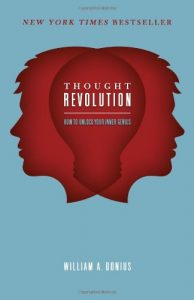
I’m curious, are there tools that help with maybe the editing process, maybe with just the creative process, the brainstorming process. I’ll give you one example before you provide one. I interviewed Bill Donius, author of Thought Revolution; he had shared this amazing technique where you access the right hemisphere of your brain. The left hemisphere is where the verbal centers are and where a lot of us, more technical people tend to live like me. So if you don’t access your right brain, all the best creative ideas may not surface. The process that he teaches is, first of all, you just get in a calm space, you kind of take a deep breath, close your eyes, you take the pen in your left hand if you’re right-handed. So you use the opposite hand from your dominant hand, and you squeeze the pen, and you think to yourself this intention, I want my right hemisphere to chime in, to tell me, whatever. If you want to know what you should be working on today, if you want to know what the vision or mission of your company is, you want to know how to solve a particular problem, you want to know what your totem animal is, that was an exercise that we did that year. It was pretty fun.
The first time I did, I heard him speak at a mastermind, and he did this exercise. The first time was just normal, like write with your normal dominant hands, think of your totem animal, the animal you most resonate with or relate to and write it down. And I wrote down zebra, it’s so distinctive and memorable and remarkable and all that super cool. But then I did the exercise where you squeeze the pen in your hand, and you ask your right hemisphere to chime in and answer that question. And it came out as a humpback whale, completely different. And then I started thinking about this after the fact I’m like, wow, that resonates, it feels more like me at my core. I’m more of the humpback whale than the zebra. And that just really stuck with me, and so I knew I had to have him on the podcast. So that was a great tool. I highly recommend it. Listeners, go check out that episode. But what sort of tools do you have that we could cover in the next few minutes because then we’re almost out of time. But what would be some great tools that you’d want to share that can help with fostering creativity, or editing, or whatever other processes artists and creatives need to go through?
I think that there are two key factors. One is the intrinsic love of learning and curiosity. So how that translates into practical advice is, you read books, you go to movies, you see plays, you go to concerts, you go to galleries, you walk around the streets, with your eyes open, you be present wherever you are to take in what’s going on around you. You become both a participant and observer in life; the more inputs that you are getting from, the more disparate areas, the more curiosity that you have that makes you want to pursue sometimes, I’m sure you’ve done it, I’ve done it many times going down the rabbit hole online of some topic that you’re interested in. That fosters creativity because you’re getting so many different influences, so many different ideas, so many different sounds, so many different visuals. And that I think is the key is just being alert, awake, present, and available. With an unending and boundless curiosity to explore things that you don’t know anything about.

Do you need a notebook or something to write these things down, you put them into your iPhone, or how do you capture this stuff so that you can ruminate on it or come up with adjuncts or different ways.
A couple of things. I will send myself a memo or an email on my phone if I’m walking around and think of something. I make myself post a picture every day on Instagram that I take, not that I find so that I’m always walking around New York with my visual acuity on high alert so I can find interesting images, just because it just keeps me in that game because I’m always framing shots as a director in terms of what I do. And then physically writing things down, like keeping a notebook next to my bed because we’ve all had the experience of you have a great idea, you’re kind of too tired to go find the pen and paper, and the next morning, all you can remember is that you had a great idea, but you don’t know what the hell it was. And there is science behind physically writing something down because that reinforces in your brain, that reinforces the memory of doing it.
Yeah. And if you wake up and you think you’re gonna write that down in a few minutes, it’ll probably be gone by the time you brush your teeth or get back to the notebook. So act fast. Oh, and I should mention too, this was a key part of Bill Donius’ technique; it’s kind of obvious now after I explain it, but you have to write it in your non-dominant hand. And that is what accesses the right hemisphere. So you’re squeezing the pen in your hand, and then you have with that intention of accessing the right brain, you’re gonna write, it’s gonna be messy, it doesn’t matter. It’s all about just letting your right hemisphere kind of take over that hand and write. And whatever comes out of that is most likely the stuff that is trapped in that right hemisphere, like the humpback whale.
And you certainly don’t want a humpback whale trapped in your right hemisphere, very crowded in there.
I just realized that we’re out of time. I’ve got to make sure our listeners know where to go to follow you and to get the book and to learn more from you. So we should probably give them the websites and social accounts and all that to go to.
Okay. So two websites, madoffproductions.com, where you’ll see my video and film work, acreativecareer.com where you’ll see clips of the class guests that I have, and you’ll also see the book there, which is Creative Careers: Making a Living with Your Ideas available at Amazon and all fine booksellers, and Instagram at @acreativecareer and I think, and you can find me on LinkedIn, B. Jeffrey Madoff, and there’s a Creative Careers group.
Awesome. Thank you so much, Jeff. This was fabulous and inspiring, and lots of pearls of wisdom that you shared. So thank you so much.
Thank you for having me. I love the conversation. It was really fun. Thanks a lot.
And thank you, listeners. Now go off and get some amazing creative things out of your head and into the real world, and we’ll catch you on next week’s episode.

